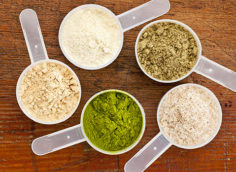Pasta's gotten a bum rap as a food that makes you fat. Maybe it's because pasta is white and other white foods like sugar and white bread are notoriously high on the make-you-fat list.
Or it could be because pasta is deemed guilty based on the company it usually keeps. It's most often combined on a plate with a ladle of cheese and so much glistening oil and fat in general that you can see your reflection drooling back at you.
But pasta by itself has a relatively low glycemic index (a ranking based on how fast a food raises your blood sugar levels), so it shouldn't really make you fat, at least not more than a "good" carb source like oatmeal. That's old news, but no one's ever bothered to look at the actual body of evidence to see how that low glycemic index (GI) value affects your waistline... until now.
It turns out that not only will eating pasta up to three times a week not make you fat, it might actually cause you to lose body fat. And, if you make a few modifications in how you prepare it, you might even turn it into more of a "safe" dietary choice.
Researchers compiled over 30 randomized controlled trials that collectively asked 2,500 people to replace other carbohydrates in their diet with pasta 3 times a week for an average of 12 weeks.
The meta analysis showed that the participants didn't gain any weight. In fact, they lost a little bit (about 1.4 pounds).
Okay, I know your immediate impulse is go into the kitchen, boil up 100 pounds of spaghetti, fettuccine, and manicotti, throw it into the tub, strip naked, and dive into the pasta, taking in deep, baleen-whale mouthfuls as you breach the pasta surface.
But the scientists defined a portion of pasta as a half-cup of cooked pasta, which is a lot less than your Nonna would serve you at Sunday dinner. Neither was the pasta in the meta study combined with cheese sauce and a greasy meatball the size of Nonna's goiter.
Still, it seems that pasta, in reasonable amounts, can be part of a healthy diet. And, if you make a few changes to the way you prepare it, you might even be able to kick up that measly half-cup portion size to a full cup without suffering any ill effects.
Maybe you're wondering why, if pasta is one of those undesirable white foods, it doesn't have the same effect on your body as they do. It's because pasta is unique among carbohydrates in that its starch molecules are "protected" by a network of gluten, which makes it harder for your body to convert to glucose.
However, you can make it even harder for your body to digest pasta by making some cooking modifications. First of all, the longer you cook it, the easier it is for your body to absorb it. As such, always cook pasta al dente, or until it's slightly firm and still a little chewy.
You can also make the starch in pasta "resistant" – more difficult for the body to digest. If you cook the pasta and then cool it, you convert the pasta into something that's more like fiber than starch. You can either eat it cold later or re-heat it, which, as a recent but informal study conducted on the BBC show, "Trust Me, I'm a Doctor" found, makes the pasta even more resistant.
There's one more thing you can do, too, to make pasta an even friendlier carb, but it's only a theory based on another study. Researchers in India found that if you throw in a teaspoon of coconut oil when cooking rice, you make some of the inherent polysaccharides even more resistant.
That ends up reducing the calorie count. However, there's no reason to think the method wouldn't work with pasta, too, as it contains those same polysaccharides. Just add a teaspoon of coconut oil or, as is probably more appropriate, olive oil, into the boiling water before you add your pasta.
Using these three modifications – the reduced cooking time (until it's al dente), cooking it and then either eating it cold or reheating it, and throwing a teaspoon of oil into the water you use to boil it – should allow you to enjoy an entire cup of pasta three times a week and not gain weight.
- Chiavaroli L et al. Effect of pasta in the context of low-glycaemic index dietary patterns on body weight and markers of adiposity: a systematic review and meta-analysis of randomised controlled trials in adults. BMJ Open. 2018 Apr 2;8(3):e019438. PubMed.




